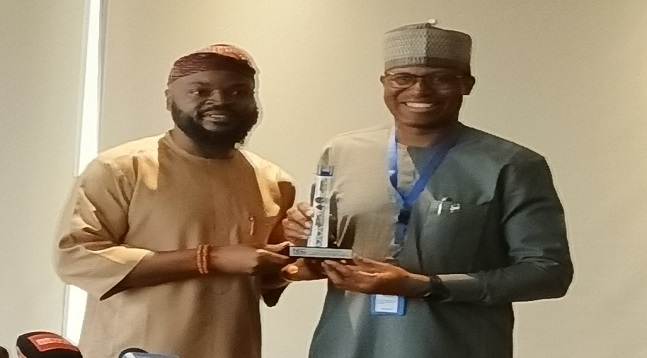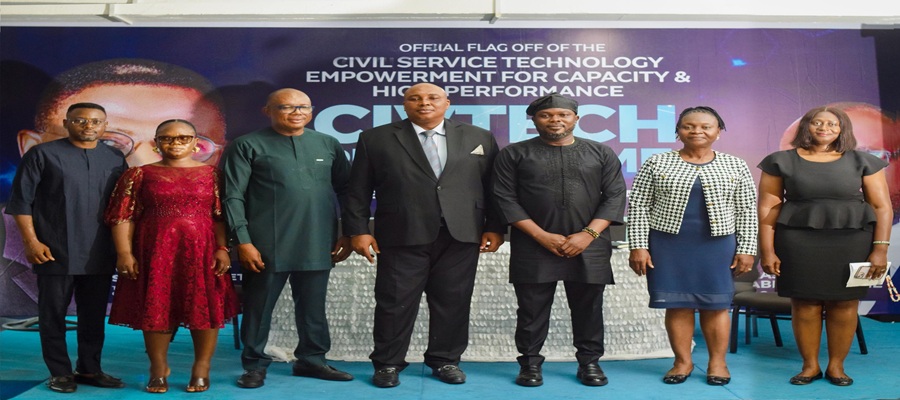Telecom
Zoho Corporation Expands AI Capabilities with New Zia Agents and Studio

Zoho Corporation, a global technology company, today expands the scope of Zia with the announcement of Zia Agents, Agent Studio, and Agent Marketplace. Together, these solutions empower enterprises to access, build, and distribute intelligent, autonomous digital agents across their organisations.

Beginning today, Zoho and ManageEngine will be previewing pre-built, task-specific Zia Agents, which will deploy across Zoho Corporation’s combined portfolio of 100+ products in the coming weeks.
“The speed of disruption and quality of innovation we’re seeing in our industry right now has encouraged me to focus on my passion area, technology. I will devote more time to hands-on technical work for the company, spearheading several deep R&D initiatives, beginning with AI,” said Sridhar Vembu, Zoho Corporation’s Co-founder and Chief Scientist. “Utilising Zoho’s deep engineering expertise, its own data centres, and shared data model, we will develop powerful and usable solutions that drive customer value while retaining our commitment to customer flexibility and data privacy.”
Zoho Corporation’s in-house AI has evolved over the past decade from proactive to prescriptive to generative to agentic:
Zia: Launched in 2015, Zia is Zoho Corporation’s foundational AI, facilitating all intelligent and contextual actions across the company’s ecosystem of apps. Zia possesses a vast and diverse skillset. New skills are being implemented regularly to boost customer experience and drive productivity.
Ask Zia: Launched in 2018, Ask Zia has developed into a system-wide conversational assistant that helps employees work smarter and accomplish tasks more effectively. For example, an account manager can review a report of customers at risk of churn, summarise the outcomes of each customer’s recent interactions, filter and summarise helpdesk tickets, analyse trends in their industry, and reach out to that customer for a meeting based on the employee’s upcoming travel schedule, without leaving the Ask Zia interface. Ask Zia is powered by Zoho’s unified data platform and will be contextually embedded across all applications.
Zia Agents: Today, Zoho Corporation has previewed some of the several dozens of pre-built Zia Agents that will be rolled out in the coming months, including an Account Manager Agent, SDR Agent, HR Agent, Customer Support Agent, IT Help Desk Agent, and a SalesCoach Agent. For customers, partners, and developers looking to create their own agents, Zoho is launching Zia Agent Studio, allowing them to build and deploy customised agents with inherited skillsets, which can then be distributed through Zoho’s Agent Marketplace.
Zia Agent Studio: Offering no-code and low-code experiences, Zia Agent Studio enables users to build autonomous agents with skills relevant to their specific needs. Zia Agent Studio users can also access a wide range of pre-existing Zia Skills, tools from across the Zoho ecosystem, data from a unified data platform, and a range of language models. These can be agents within a function (like an SDR agent or email support agent) or natively cross-functional agents (like an RFP agent or loan approval agent).
They can be deployed on any Zoho application and summoned using Ask Zia. Moving forward, Zia Agents will be deployable in any third-party application as well. Additionally, Zia Agents with complementary skillsets can be combined using Zia Agent Studio, creating a single agent capable of cross-functional work.
Agent Marketplace: Agents created using Zia Agent Studio can be published in the Agent Marketplace. Zoho Corporation will offer a pre-built roster of agents, while the company’s ecosystem of partners and developers can build and distribute specialised AI agents through the marketplace, which can be reused and instantly deployed by organisations.
Organisational Differentiation
Today’s announcement follows record growth for Zoho Corporation, which onboarded 110,000 new customers globally in 2024. With over 850,000 customers globally in diverse industries, using a range of tools across Zoho and ManageEngine, Zoho Corporation’s AI solutions are informed by a vast range of functional data. This is a core differentiator for the company, putting it in a unique position to serve businesses with cutting-edge technology.
Technological Differentiation
Zoho Corporation’s distinct technological breadth and depth is a fundamental differentiator, particularly in AI development and deployment. Leveraging its shared data model, owned and managed tech stack, including global data centres, and a broad application portfolio, Zoho Corporation’s highly secure, privacy-compliant, usable, capable, and deeply knowledgeable AI agents deliver superior technology at a high value to its growing customer base.
Availability
These capabilities will begin to roll out to a limited set of customers, which will expand monthly.
Telecom
NCC Mulls Sanction on Road Contractors Destroying Metro Fibre of Telcos

Nigerian Communications Commission (NCC) is considering imposing sanction on any road contractor that destroys telecommunications metro fibre across the country.

Idris Olorunnimbe, chairman, Board of Commissioners, NCC, stated this at congratulatory visit to the Chairman by members of Association of Licensed Telecommunications Operators of Nigeria (ALTON) in Lagos yesterday.
According to him, “I think what we need to do to address the damage of metro fibre by government contractors is simply. He who cuts It must fix it, and we’ll take this message to our state governments.
If any contractor knows that if they damage that critical national infrastructure, their work is going to stop and they are going to be the ones to fix it, they will not destroy it.
Responding, Engr. Gbenga Adebayo, chairman, Association of Licensed Telecommunications Operators of Nigeria (ALTON), said up until now, there are no consequences for those infractions, and if there are no consequences, the tendency to continue to do bad is very high.
“Contractors of government carrying out roadworks, whether road maintenance or road expansion, and their machines destroy communications super highway at will, if there are consequences, or if there were consequences some of those actions will not have escalated to the level that we are in.
“What the chairman has said today is very important, if you destroy it you fix it. What we are expecting now is that the consequence of managing those problems will be a lot more, and there will be legal deterrent for people from destroying operators’ fibre. I must emphasize the communication super highway. That’s the highway by which all the signals are carried.
“When this highway is broken, it’s like you have a major bridge that’s broken. You can’t reach east, neither can you reach west. And until we take it as the major super communications highway and so protective, we will continue to be where we are.
“That’s actually what it is. When this highway is broken, we are all affected. So, it’s no longer an infrastructure that is for operators, but it belongs to all of us. If I don’t have service on my phone, some of these are the consequence of this violation that we are seeing.
Earlier in his welcome address, Engr. Adebayo highlighted some of the key challenges in the sector which includes: Daily fibre cuts — often caused by federal and state road construction contractors — are creating enormous economic losses.
- Nationwide service disruptions
- Destruction of critical digital infrastructure
- Loss of assets without compensation
- Banking, education, and security interruptions
There is currently insufficient institutional recourse for operators when these damages occur. A structured pre-construction fibre mapping and mandatory coordination framework is urgently required.
Key Regulatory Priorities for Sector Stability
- Independence of the Regulator
He said regulatory independence ensures:
- Credible oversight
- Investor confidence
- Transparent decision-making
- Long-term sector stability
Independence must not only exist in law — it must be visible in practice.
“We recommend: Legislative reinforcement explicitly affirming NCC independence
- Clear codification of interaction boundaries between the regulator and supervising authorities
- Operational safeguards insulating regulatory processes from undue influence
Multiple Regulation
Overlapping regulatory interventions by various MDAs on matters already within NCC jurisdiction create:
- Duplicative investigations
- Conflicting directives
- Increased compliance costs
- Regulatory uncertainty
“We recommend structured inter-agency coordination frameworks and legislative clarification reaffirming NCC’s exclusive jurisdiction over telecommunications matters.
Multiple Taxation
Adebayo stated that operators continue to face excessive sub-national taxes and levies.
Enforcement tactics such as site shutdowns directly affect Quality of Service and national connectivity.
A harmonized national telecom taxation framework is essential for broadband expansion and digital inclusion.
Telecom
Gemini App Rolls Out AI Music Creation with Lyria 3 Model

Google has launched Lyria 3, its advanced generative music model, in the Gemini app, enabling users to create 30-second tracks from text prompts or images.

Lyria 3 Model
Senior Product Managers Joël Yawili and Myriam Hamed Torres announced the feature, which generates lyrics, styles, vocals, and tempos based on descriptions like “a fun afrobeat track about childhood memories of home-cooked plantains.”
Key upgrades include auto-generated lyrics, user control over elements, and more realistic, complex audio.
Usage Options
Text-to-track: Prompt genres, moods, or memories, e.g., “nostalgic afrobeat for my mother’s plantain meals with African vibe.”
Image/video-to-track: Upload photos/videos for mood-matched songs, e.g., “track about my dog on a hike.”
Tracks include custom Nano Banana cover art for easy sharing. Available for users 18+ in English, German, Spanish, French, Hindi, Japanese, Korean, Portuguese; Google AI subscribers get higher limits.
Verification and Responsibility
All outputs embed SynthID watermark; users can verify uploaded audio for Google AI origin.
Developed with music community input since 2023, Lyria 3 avoids mimicking artists—prompts inspire style only—with filters, reporting, and policy enforcement against IP violations.
Also enhances YouTube Shorts soundtracks via Dream Track for creators.
Access at gemini.google.com.
Telecom
NITDA Pushes Tech Skills for 2,000 Cross River Workers

Kashifu Inuwa, Director General of the National Information Technology Development Agency (NITDA), has called for a bold transformation of Nigeria’s public service from traditional bureaucracy to digital excellence, as he participated in the official flag-off of the Civil Service Technology Empowerment for Capacity and High Performance (CIVTECH) Programme in Cross River State.

Group photo of the HOS, Mr Orok Okon (middle), Rep of DG NITDA, Dr Aristotle Onuma (3rd left), DG CRS MEDA, Mr Great Ogban other state government officials
The programme, hosted by the Cross River State Government and organised by the Cross River State Microfinance and Enterprise Development Agency (CRS MEDA), is designed to equip 2,000 civil servants with critical digital skills required to drive efficient and technology-enabled service delivery.
In his keynote address titled “From Bureaucracy to Digital Excellence: Leveraging Technology for a High-Performing Public Service,” the NITDA DG who was represented by the Director of the Stakeholders Management and Partnership department, Dr Aristotle Onumo, emphasised that the future of governance depends on the ability of public institutions to embrace digital transformation.
“For decades, the public service has been the engine room of national development but in an era defined by speed, data, and innovation, traditional bureaucratic processes are no longer sufficient to meet the expectations of citizens and businesses,” he stated.
He noted that citizens today expect government services to reflect the efficiency and convenience they experience in digital banking, e-commerce, and mobile platforms.
Highlighting the economic imperative of digitalisation, the DG pointed out that Nigeria’s ICT sector contributed nearly 20 percent to the nation’s real GDP in 2024, underscoring the growing role of technology as a driver of economic growth and competitiveness.
While noting that digital transformation is no longer just a technology agenda, he said, “It is an economic agenda, it is a governance agenda, and it is a national competitiveness agenda.”
According to him, the cost of maintaining outdated bureaucratic systems includes delayed decision-making, inefficiencies, limited transparency, and declining public trust.
However, he emphasised that digital excellence provides a pathway to faster service delivery, improved accountability, increased productivity, and enhanced citizen satisfaction.
“This is the shift from paperwork to performance, from process-driven governance to outcome-driven governance,” he added.
Inuwa further emphasised that while infrastructure and systems are important, people remain central to institutional transformation.
“Technology alone does not transform institutions. People do, and digital excellence requires public servants who are digitally skilled, innovation-driven, solution-oriented, performance-focused, and citizen-centric,” he asserted.
Assuring participants that technology is not designed to replace public servants but to empower them, he said, “Technology frees you from repetitive administrative tasks so you can focus on strategic thinking, policy innovation, and national development.”
Outlining NITDA’s strategic priorities, he referenced ongoing efforts to promote digital literacy and skills development, strengthen digital public infrastructure, automate government processes, enhance cybersecurity and data protection, and encourage the adoption of emerging technologies such as Artificial Intelligence across public institutions.
He commended Cross River State for embracing reform and positioning itself at the forefront of sub-national digital transformation, noting that initiatives like CIVTECH align with the Federal Government’s broader vision of building an efficient, transparent, and citizen-centric public service.
“The future of governance is digital. Together, we can transform governance. Together, we can transform Nigeria. And together, we can build a public service worthy of the digital age,” he concluded.
Declaring the flag-ff open, the state’s Head of Service, Mr Orok Okon, reaffirmed the government’s unwavering commitment to strengthening the capacity of its workforce.
He emphasised that, in an era defined by rapid technological advancement, public institutions must equip their personnel with the skills and competencies necessary to deliver efficient, technology-enabled services.
According to him, investing in human capital is essential not only for improving internal administrative processes but also for ensuring that citizens receive timely, transparent and high-quality service across all sectors.
Earlier in his welcome address, the Director General of CRS MEDA, Mr Great Ogban, expressed appreciation to the Governor and the Head of Service of the state for their consistent commitment to technology-driven workforce development.
He encouraged all shortlisted trainees to show full dedication, emphasising that their participation aligns with the state’s goal of transitioning toward a fully paperless civil service.
He expressed strong optimism about the state’s growing partnership with NITDA, noting that such collaboration will play a pivotal role in accelerating the digital transformation of Cross River State.
According to him, the joint efforts between the state government and NITDA will not only enhance the quality of digital training provided to civil servants, but also to help fast-track the transition toward a more efficient and technology-driven civil service.

 Telecom2 days ago
Telecom2 days agoTerra Moves to Expand in African Drone Sector, Secures $22m Funding

 Telecom2 days ago
Telecom2 days agoTemu Assures Compliance Amid Nigeria Data Privacy Probe

 E-Financial2 days ago
E-Financial2 days agoDMO Offers ₦800bn FGN Bonds in February Auction Surge

 E-Financial2 days ago
E-Financial2 days agoDanjuma, Taj Bank Staff Jailed for 5 Years over N22m Fraud

 E-Financial2 days ago
E-Financial2 days agoKPMG Outlook Reveals Financial Services CEOs Double down on AI, Resilience and Growth in 2026

 Telecom2 days ago
Telecom2 days agoMTN Group Announces Proposed Full Acquisition of IHS Towers

 News2 days ago
News2 days agoChianugo, Nigerian $150m suit Against Google, GoDaddy.com Stalled due Judge’s Absence

 General News2 days ago
General News2 days agoFG to Review MTN’s $6.2Bn IHS Acquisition — Tijani






















